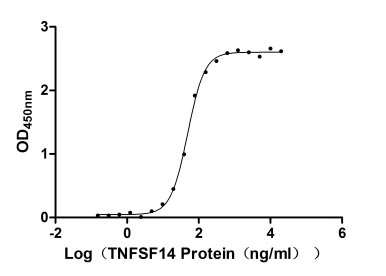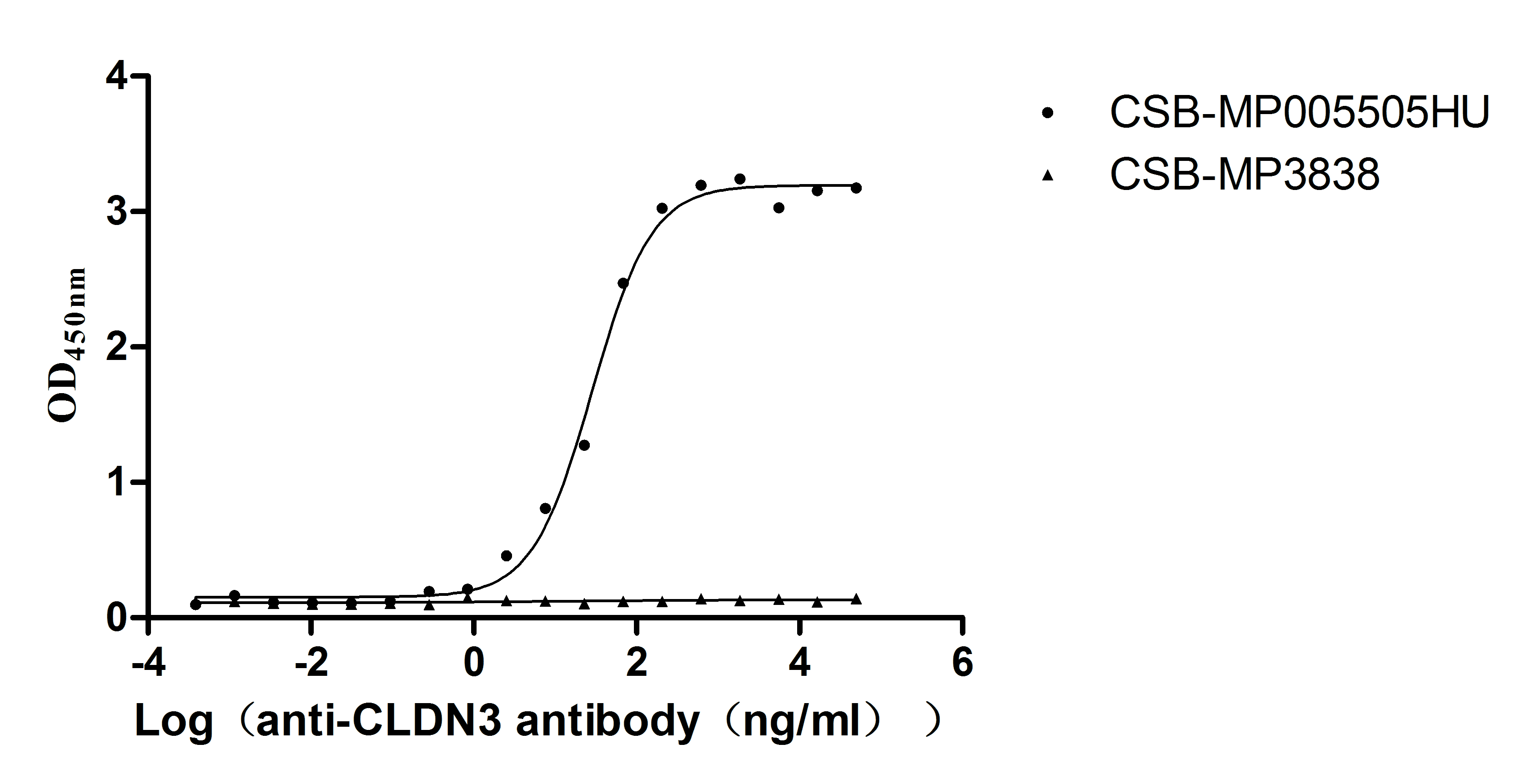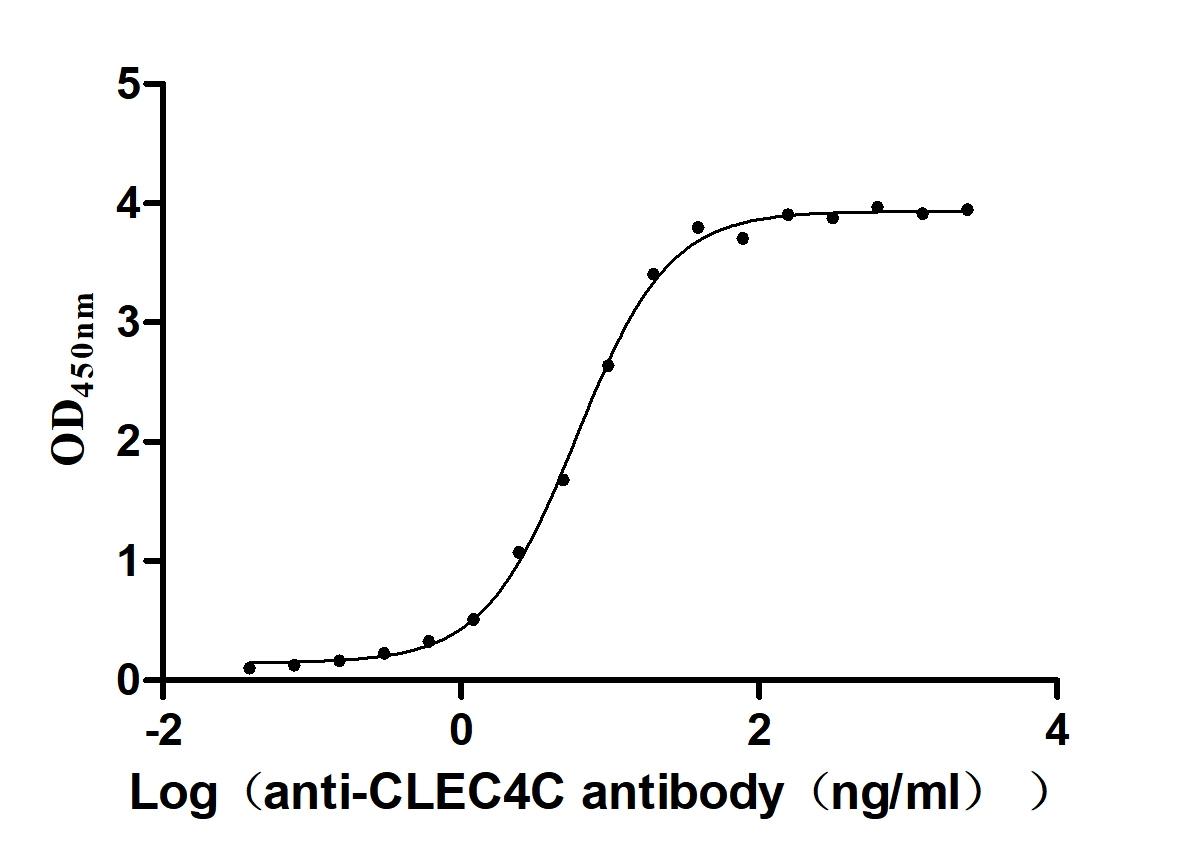Recombinant Human Insulin-induced gene 2 protein (INSIG2)
In Stock-
货号:CSB-CF896742HU
-
规格:¥9720
-
图片:
-
其他:
产品详情
-
纯度:Greater than 85% as determined by SDS-PAGE.
-
基因名:INSIG2
-
Uniprot No.:
-
别名:INSIG2; Insulin-induced gene 2 protein; INSIG-2
-
种属:Homo sapiens (Human)
-
蛋白长度:Full Length
-
来源:in vitro E.coli expression system
-
分子量:32.2 kDa
-
表达区域:1-225aa
-
氨基酸序列MAEGETESPGPKKCGPYISSVTSQSVNLMIRGVVLFFIGVFLALVLNLLQIQRNVTLFPPDVIASIFSSAWWVPPCCGTASAVIGLLYPCIDRHLGEPHKFKREWSSVMRCVAVFVGINHASAKVDFDNNIQLSLTLAALSIGLWWTFDRSRSGFGLGVGIAFLATVVTQLLVYNGVYQYTSPDFLYVRSWLPCIFFAGGITMGNIGRQLAMYECKVIAEKSHQE
Note: The complete sequence including tag sequence, target protein sequence and linker sequence could be provided upon request. -
蛋白标签:N-terminal 10xHis-tagged and C-terminal Myc-tagged
-
产品提供形式:Liquid or Lyophilized powder
Note: We will preferentially ship the format that we have in stock, however, if you have any special requirement for the format, please remark your requirement when placing the order, we will prepare according to your demand. -
缓冲液:If the delivery form is liquid, the default storage buffer is Tris/PBS-based buffer, 5%-50% glycerol. If the delivery form is lyophilized powder, the buffer before lyophilization is Tris/PBS-based buffer, 6% Trehalose.
-
复溶:We recommend that this vial be briefly centrifuged prior to opening to bring the contents to the bottom. Please reconstitute protein in deionized sterile water to a concentration of 0.1-1.0 mg/mL.We recommend to add 5-50% of glycerol (final concentration) and aliquot for long-term storage at -20°C/-80°C. Our default final concentration of glycerol is 50%. Customers could use it as reference.
-
储存条件:Store at -20°C/-80°C upon receipt, aliquoting is necessary for mutiple use. Avoid repeated freeze-thaw cycles.
-
保质期:The shelf life is related to many factors, storage state, buffer ingredients, storage temperature and the stability of the protein itself.
Generally, the shelf life of liquid form is 6 months at -20°C/-80°C. The shelf life of lyophilized form is 12 months at -20°C/-80°C. -
货期:3-7 business days
-
注意事项:Repeated freezing and thawing is not recommended. Store working aliquots at 4°C for up to one week.
-
Datasheet & COA:Please contact us to get it.
相关产品
靶点详情
-
功能:Oxysterol-binding protein that mediates feedback control of cholesterol synthesis by controlling both endoplasmic reticulum to Golgi transport of SCAP and degradation of HMGCR. Acts as a negative regulator of cholesterol biosynthesis by mediating the retention of the SCAP-SREBP complex in the endoplasmic reticulum, thereby blocking the processing of sterol regulatory element-binding proteins (SREBPs) SREBF1/SREBP1 and SREBF2/SREBP2. Binds oxysterol, including 22-hydroxycholesterol, 24-hydroxycholesterol, 25-hydroxycholesterol and 27-hydroxycholesterol, regulating interaction with SCAP and retention of the SCAP-SREBP complex in the endoplasmic reticulum. In presence of oxysterol, interacts with SCAP, retaining the SCAP-SREBP complex in the endoplasmic reticulum, thereby preventing SCAP from escorting SREBF1/SREBP1 and SREBF2/SREBP2 to the Golgi. Sterol deprivation or phosphorylation by PCK1 reduce oxysterol-binding, disrupting the interaction between INSIG2 and SCAP, thereby promoting Golgi transport of the SCAP-SREBP complex, followed by processing and nuclear translocation of SREBF1/SREBP1 and SREBF2/SREBP2. Also regulates cholesterol synthesis by regulating degradation of HMGCR: initiates the sterol-mediated ubiquitin-mediated endoplasmic reticulum-associated degradation (ERAD) of HMGCR via recruitment of the reductase to the ubiquitin ligase RNF139.
-
基因功能参考文献:
- IINSIG2 gene single nucleotide polymorphisms and global DNA methylation are linked with weight loss in obese patients. PMID: 29138870
- INSIG2 plays a role in weight gain and obesity during clozapine treatment PMID: 27885961
- These results indicate that HIF-mediated induction of Insig-2 and degradation of HMGCR are physiologically relevant events that guard against wasteful oxygen consumption and inappropriate cell growth during hypoxia. PMID: 28416613
- There may be a connection between INSIG2 expression and metastatic dissemination of colorectal cancer without any effect on tumorigenesis. PMID: 26662938
- Insulin resistance in obese boys leads to up-regulation of INSIG2 gene expression as well as to down-regulation of PFKFB1, PFKFB3, and HK2 genes in the blood cells as compared to obese patients with normal insulin sensitivity. PMID: 26827442
- Results confirmed that genetic variation in INSIG2 is associated with both overweight and LDL in non-Hispanic white children. PMID: 25607990
- This study suggests that the G allele in the INSIG2 single nucleotide polymorphism rs7566605 is more relevant for changes in intramuscular adipose tissue following training than for the amount of subcutaneous fat. PMID: 23941145
- INSIG2 is involved in adipogenesis and MC4R effects hormonal appetite control in response to the amount of adipose tissue. PMID: 24518831
- The results provided evidence for identifying genetic factors of nonalcoholic fatty liver disease (NAFLD) and may be useful for risk assessment and personalized medicine of NAFLD. PMID: 24458218
- The INSIG2 rs7566605 SNP may not play a role in the development of obesity-related metabolic traits in Malaysian Malays. PMID: 25062423
- Data show the essential role of PPARgamma and PPARgamma coactivator 1alpha (PGC-1alpha) in up-regulating Insig-1/2 expression, defining a mechanistic pathway triggered by CD36, and leading to cholesterol depletion in hepatocytes. PMID: 24371122
- The rs13428113 polymorphism in INSIG2 gene was associated with abnormal lipid metabolism in overweight and obese children. PMID: 21163096
- genetic association/nutrigenomics studies of populations in Samoa: Data suggest that an SNP in INSIG2 (rs9308762) is associated with increased risk of metabolic syndrome X in Samoans eating modern diet (rather than traditional Samoan diet). PMID: 22968099
- In single-marker-based analysis, the INSIG2 rs11123469-C homozygous genotype was found to be more frequent in patients with metabolic syndrome than those without metabolic syndrome. PMID: 20877301
- Single nucleotide polymorphism in INSIG2 is associated with asthma susceptibility through gene-gene interactions. PMID: 22355322
- Results indicated that the G-102A INSIG2 polymorphism has no consistent effect on BMI in general populations, but could influence HDL cholesterol in females. PMID: 21978759
- INSIG2 was significantly associated with fasting plasma glucose in patients with schizophrenia PMID: 22020349
- No significant associations were observed between rs7566605 near the INSIG2 gene and any adiposity-related phenotypes in African- and European-American youth. PMID: 21544599
- Insig2 is overexpressed in pancreatic cancer under hypoxic conditions and is correlated with the malignant behaviors of pancreatic cancer. Insig2 knockdown decreased the cell proliferation and invasion of human pancreatic cancer cell line SUIT-2. PMID: 21443541
- genetic polymorphism along with sex and age factors contribute to prevalence of cardiovascular disease PMID: 20920244
- the INSIG2 rs7566605 polymorphism is not associated with body mass index and breast cancer risk PMID: 20955599
- These results suggest that INSIG2 genetic variants may have a more direct role in lipid and apolipoprotein B/lipoprotein metabolism than in obesity. PMID: 20858904
- This study was unable to replicate significant associations in patients of European ancestry and weight-gain induced by antipsychotics with single-nucleotide polymorphisms in Insulin Induced Gene 2. PMID: 20373477
- Results indicated that this INSIG2 polymorphism has no significant effect on body mass index and plasma lipids in the Czech Slavonic population. PMID: 20653998
- While study did not confirm an association between rs7566605 and BMI in obese children in Sardinia, abnormalities of glucose metabolism and genotype, indicate that INSIG2 may be involved in glucose metabolism. PMID: 20645959
- a role of INSIG2 sequence variation in the regulation of cholesterol metabolism. PMID: 20045156
- Deletion analyses on 3 kb of 5'-flanking DNA of the INSIG2 gene revealed the functional importance of a 350-bp region upstream of the transcription start site. PMID: 20145255
- this study suggests that sequence variants in INSIG2 likely influence the risk for obesity related traits PMID: 20028541
- A total of 15.1% of participants were overweight or obese at age 16 y. No associations with INSIG2 were found. PMID: 20007308
- children with the combination of the INSIG2 CC genotype and the FTO AA genotype showed the worst outcome in a lifestyle intervention, suggesting that the effects of INSIG2 and FTO aggravate each other. PMID: 19224890
- degradation of ubiquitinated Insigs is controlled by serine residues flanking the sites of ubiquitination PMID: 16549805
- These studies identify a aspartic acid residue that is crucial for the function of Insig1 and Insig2 proteins in regulating cholesterol homeostasis in mammalian cells. PMID: 16606821
- INSIG-2 is a membrane bound oxysterol-binding protein with specificity for cholesterol derivatives that possess hydroxyl groups on the side chain. PMID: 17428920
- The association of a SNP upstream of INSIG2 with body mass index is not reproduced in all cohorts. PMID: 17465681
- The rs7566605 single-nucleotide polymorphism (SNP) was not related to plasma triglyceride levels. This suggests that, at the least, the true size of the effect on obesity of this SNP is likely to be considerably less than reported previously. PMID: 17471297
- the variant upstream of INSIG2 is not a determinant of BMI in Indian population. PMID: 17489846
- Children who were CC-homozygotes at SNP rs7566605 in the vicinity of INSIG2 lost less weight in this lifestyle intervention. PMID: 18003761
- There is no association of the rs7566605 variant with overweight in Japanese people. PMID: 18070740
- There is a lack of association between single-nucleotide polymorphism rs7566605 and being overweight among the Japanese (in the middle-aged and elderly population). PMID: 18223638
- results do not support an association of the INSIG2 gene with the regulation of body weight or parameters related to lipoprotein metabolism PMID: 18239574
- found no significant association of rs7566605 polymorphism with body mass index (BMI) and waist circumference among all participants (P=0.52), however in subjects from Shangai, the C/C genotype was associated with higher risk of BMI and obesity PMID: 18270535
- INSIG2 is involved in adipocyte metabolism and body weight regulation. PMID: 18319320
- Increased BMI in morbid obesity is associated with a combination of FTO and INSIG2 SNPs. PMID: 18347269
- Insig2 is a novel colon cancer biomarker, and suggest, for the first time, a reasonable connection between Insig2 and Bax-mediated apoptosis through the mitochondrial pathway. PMID: 18464289
- Polymorphism may be associated with obesity and body mass index in an Indian population. PMID: 18514965
- it is suggested that the CC genotype of the INSIG2 upstream SNP, rs7566605, is a protective genetic factor against hypercholesterolaemia, when exposed to a high-fat diet. PMID: 18570692
- rs7566605 in the upstream region of the INSIG2 gene was found to be associated with obesity, i.e., severe obesity, in Japanese. PMID: 18615239
- INSIG2 polymorphisms play no apparent role in the development of common forms of obesity in the Danish population but may influence body mass index and physical activity. PMID: 18682847
- common variants in FTO and INSIG2 are nominally associated with quantitative measures of obesity PMID: 18839134
- The INSIG1 gene, not the INSIG2 gene, associated with coronary heart disease: tagSNPs and haplotype-based association study. PMID: 18989534
显示更多
收起更多
-
亚细胞定位:Endoplasmic reticulum membrane; Multi-pass membrane protein.
-
蛋白家族:INSIG family
-
数据库链接:
HGNC: 20452
OMIM: 608660
KEGG: hsa:51141
STRING: 9606.ENSP00000245787
UniGene: Hs.7089
Most popular with customers
-
Recombinant Human Tumor necrosis factor ligand superfamily member 14 (TNFSF14), partial (Active)
Express system: Mammalian cell
Species: Homo sapiens (Human)
-
Recombinant Human Claudin-3 (CLDN3)-VLPs (Active)
Express system: Mammalian cell
Species: Homo sapiens (Human)
-
Recombinant Macaca fascicularis C-type lectin domain family 4 member C(CLEC4C), partial (Active)
Express system: Mammalian cell
Species: Macaca fascicularis (Crab-eating macaque) (Cynomolgus monkey)
-
Recombinant Human Dipeptidase 3(DPEP3), partial (Active)
Express system: Mammalian cell
Species: Homo sapiens (Human)
-
Recombinant DT3C (Diphtheria toxin & spg 3C domain) for Antibody Internalization Assay (Active)
Express system: E.coli
Species: N/A


















